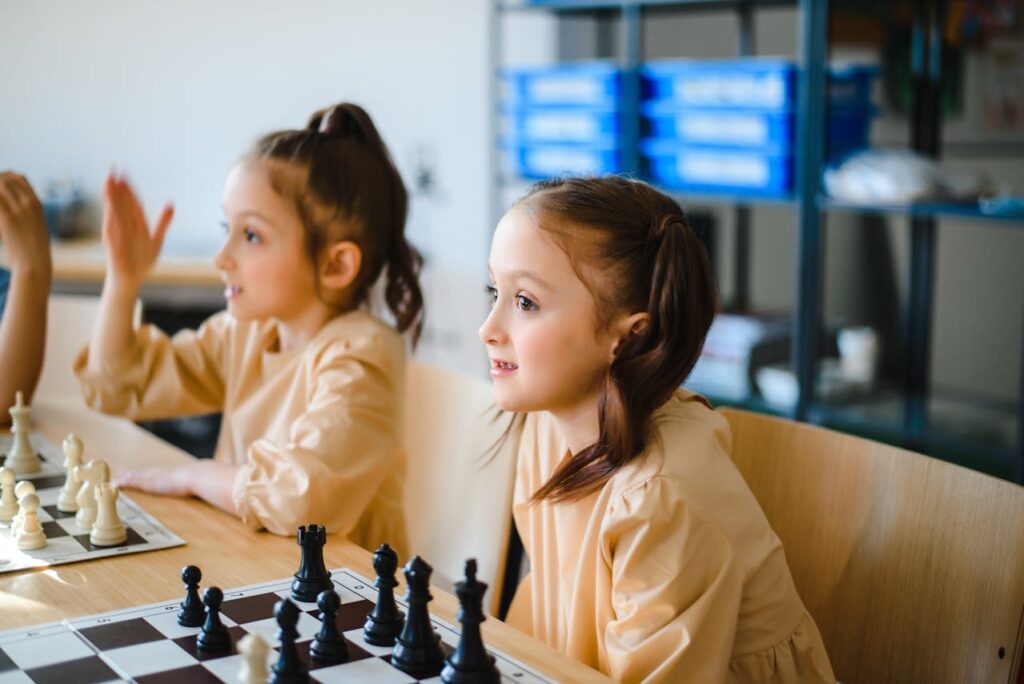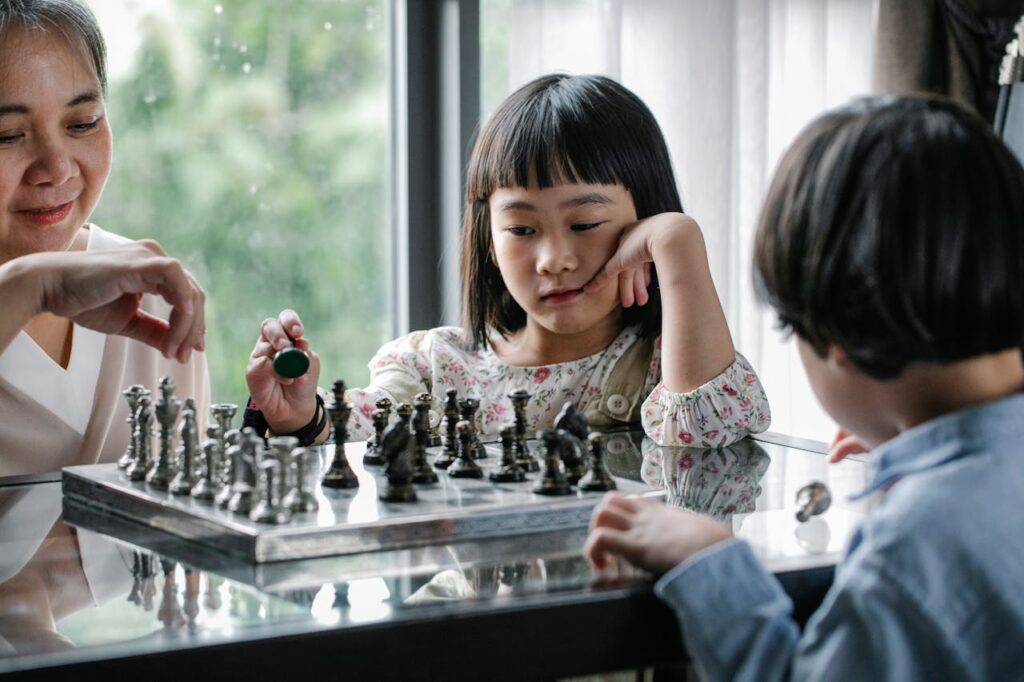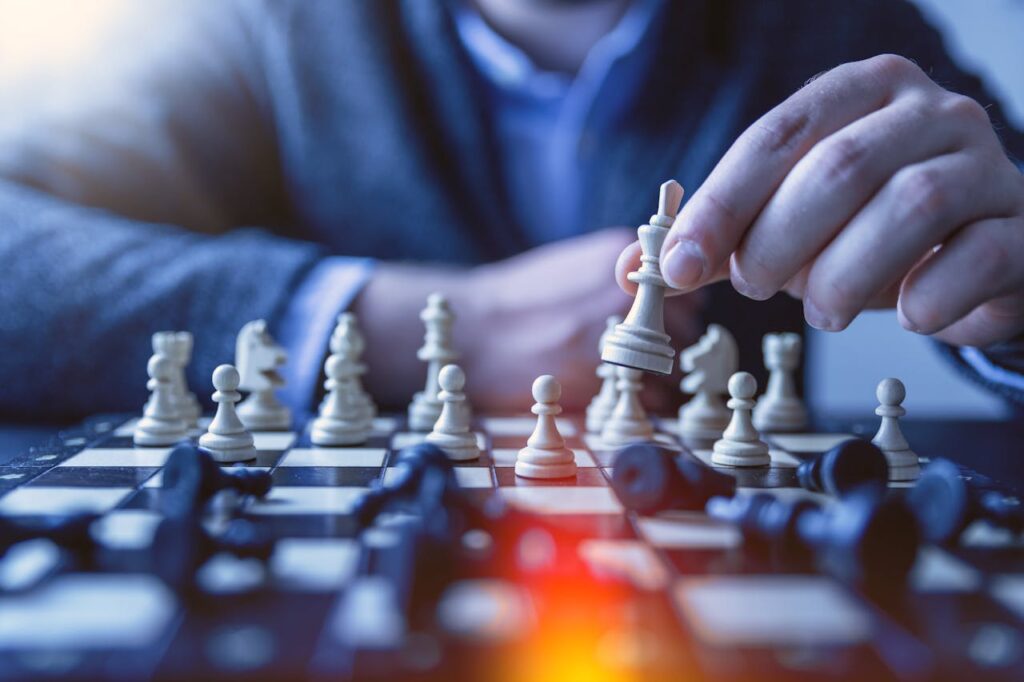In a world filled with distractions, from video games to constant notifications, helping children focus and develop a strong attention span can feel like an uphill battle. One surprising and effective way to strengthen a child’s ability to concentrate is by teaching them chess.
Chess is not just a game—it’s a powerful tool that encourages deep thinking, careful planning, and sustained focus over long periods. For many children, learning to play chess can improve their attention span and help them focus better on tasks both in and out of school.
How Chess Demands Focus
When a child sits down to play chess, they quickly realize that every move matters. Unlike many games that rely on quick reflexes or luck, chess is entirely strategic.
Each move requires careful thought, planning, and anticipation of the opponent’s next steps. Because of this, chess naturally forces players to pay close attention to what is happening on the board.
Staying Focused on Each Move
In a game of chess, there’s no room for mindless actions.
If a child gets distracted and makes a move without thinking it through, they can easily lose a piece—or worse, the game.
Each piece on the chessboard has its own role, and to make progress, a player has to think critically about where each piece should go.

This means that during the entire game, a child must be focused on their pieces, their opponent’s pieces, and how the board could change with each move.
For example, a child might be planning to move their knight, but before they make that decision, they need to stop and consider what might happen next.
By thinking ahead, the child is forced to remain fully focused on the task at hand. This process, repeated over and over during a chess match, strengthens the ability to stay concentrated for extended periods.
Enhancing Short-Term and Long-Term Focus
Chess improves two types of focus: short-term and long-term. In the short term, children must pay attention to each move as it happens.
This means focusing on the current position of the pieces, what their opponent is doing, and what their next move will be. It requires moment-to-moment focus, which is essential for making good decisions.
On the other hand, long-term focus comes into play when children need to think several moves ahead.
A skilled chess player doesn’t just focus on the next move—they’re thinking about what might happen five or even ten moves down the line.
This type of long-term planning helps children develop the ability to maintain focus over extended periods.
Managing Impulsivity
One of the challenges many children face when it comes to attention is impulsivity—the urge to act quickly without thinking.
Chess is a great way to help children manage this impulse. In chess, a rushed decision can lead to losing a game.

Children learn that acting too quickly often results in mistakes. Instead, they need to slow down, think carefully, and weigh their options before making a move.
For example, imagine a child is eager to capture an opponent’s pawn but doesn’t stop to consider how that move might leave their king exposed.
After losing the game because of this impulsive move, the child learns a valuable lesson about the importance of thinking things through before taking action.
How Chess Strengthens Mental Stamina
Playing chess isn’t just about making one or two good moves—it’s about maintaining focus and thinking strategically for the entire duration of the game.
Some chess matches can last 30 minutes, others can stretch for hours.
Building the Ability to Stay Engaged
When a child first starts learning chess, they may find it difficult to stay focused for an entire game. They might get distracted, make a few moves quickly, and then lose interest.
However, as they continue playing and understanding the depth of the game, they learn to stay engaged throughout the match.
They begin to understand that each move is part of a bigger strategy, and losing focus at any point could cost them the game.
For example, after playing a few games, a child might realize that the middle part of the game—often called the “middlegame”—is just as important as the opening moves.
They’ll learn that they can’t afford to lose focus after a strong start because their opponent might capitalize on even the smallest lapse in attention.
This lesson teaches children the importance of staying engaged, even when things feel slow or routine.
Practicing Patience
One of the key elements of chess that helps improve a child’s attention span is patience.
Chess is not a fast-paced game—it requires careful thinking and planning, and progress often happens slowly.
For kids who are used to quick wins or instant gratification, this slow pace can feel frustrating at first. However, chess teaches them the value of patience and the rewards that come with taking their time.
For instance, a child may be tempted to attack their opponent early in the game, but they soon learn that rushing into an attack without properly setting it up can backfire.

Chess encourages them to wait for the right opportunity, which often involves several quiet, seemingly small moves that gradually build into a powerful strategy.
This patience is key to succeeding in chess and is a transferable skill that benefits children in many areas of life.
Handling Distractions
In the modern world, distractions are everywhere—whether it’s a buzzing smartphone, social media notifications, or noisy environments.
One of the great benefits of chess is that it helps children learn how to block out these distractions and focus fully on what’s in front of them.
During a chess match, especially in a tournament setting, there are often external distractions: other players, background noise, or time pressure.
However, chess players must train themselves to tune these out and stay concentrated on the game.
For example, a child might be playing in a noisy environment but still needs to figure out how to outsmart their opponent’s strategy.
Over time, they learn how to block out the noise and focus solely on the chessboard, honing their ability to concentrate in challenging situations.
This skill becomes invaluable in the classroom, where children need to ignore distractions from their surroundings and focus on their schoolwork or teacher.
Cognitive Benefits: How Chess Improves Brain Function
It’s not just the act of focusing that helps children improve their attention span—there are real, measurable cognitive benefits that come with playing chess.
Chess requires both the left and right sides of the brain to work together.
Strengthening Executive Function
Executive function is a set of mental skills that includes working memory, flexible thinking, and self-control.
These skills are important for focusing attention, managing tasks, and remembering instructions.
Chess is an excellent way to strengthen executive function because it requires players to use all of these skills simultaneously.
When a child plays chess, they are constantly exercising their working memory by keeping track of the board, remembering their opponent’s past moves, and thinking ahead about their own strategy.
They also practice flexible thinking by adapting their plans based on their opponent’s moves and by finding new ways to achieve their goals if their original strategy doesn’t work.
Enhancing Problem-Solving Skills
Chess is a game of constant problem-solving. This process of continually analyzing the board and figuring out the best moves is an excellent way to develop sharp problem-solving skills.
As children become more experienced in chess, they begin to approach problems in a more structured and thoughtful way.
They learn to break down complex situations into smaller parts, analyze different solutions, and choose the best course of action.
This kind of strategic thinking not only helps children become better chess players but also improves their ability to focus and solve problems in other areas of life, such as schoolwork, puzzles, or even everyday challenges.
How Chess Improves Academic Performance Through Better Focus
One of the most practical benefits of playing chess is how it improves a child’s ability to concentrate on schoolwork.
With improved focus, children often find themselves performing better in subjects that require sustained attention, such as math, reading, and science.
Better Focus in Math and Science
Chess has a natural connection to subjects like math and science because both rely on logic, patterns, and problem-solving.
In math, children must focus on solving equations and working through problems step by step, similar to how they think through each move in chess.

In science, they must understand complex systems, test hypotheses, and anticipate outcomes—just like they do when formulating a strategy on the chessboard.
For instance, when a child plays chess, they often need to calculate several moves in advance.
This involves using logical thinking to figure out if a certain series of moves will lead to a winning position or if it might leave them vulnerable to a counterattack.
Similarly, in math, children need to calculate the steps necessary to solve problems, whether it’s basic arithmetic or more advanced subjects like algebra and geometry.
Enhanced Reading Comprehension
Although chess might seem more closely aligned with math and logic, it also has benefits for reading comprehension.
Chess encourages children to think critically, plan ahead, and anticipate outcomes—skills that are crucial for understanding and analyzing texts.
When a child reads a story, they need to follow the plot, understand character motivations, and make predictions about what might happen next.
These are similar to the skills used in chess, where players must track the position of each piece, understand their opponent’s strategy, and predict what their opponent’s next move might be.
Chess teaches children to engage deeply with complex ideas and to think critically about the information in front of them.
Building Better Study Habits
Playing chess teaches children to develop good study habits, which are essential for academic success.
When a child practices chess, they are not only playing the game—they are also learning new strategies, studying patterns, and reviewing their mistakes to improve.
These habits are directly transferable to schoolwork.
For example, when preparing for a chess tournament, a child might study openings, practice specific tactics, and review games they’ve played to learn from their mistakes.
These same habits can be applied to studying for a test or completing a long-term project.
Chess teaches children how to set goals, break tasks into smaller parts, and stay focused on improvement over time.
Emotional Benefits: Building Resilience and Reducing Anxiety
In addition to its cognitive and academic benefits, chess also has a profound impact on a child’s emotional development.
By improving their attention span and teaching them to focus on the present moment, chess can help children manage stress, build resilience, and reduce feelings of anxiety.
Staying Calm Under Pressure
Chess is often compared to life in that it involves facing a series of challenges, some expected and some not.
In chess, children often face difficult situations where they are under pressure to make the right move, particularly when the game is nearing its end or when they are low on time.
The ability to stay calm and think clearly under these conditions is one of the most important lessons that chess teaches.
For example, a child might find themselves in a tricky position, with only a few seconds left on the clock to make a move.
While it’s natural to feel anxious in these moments, chess encourages players to stay calm, trust their strategy, and focus on the task at hand.
Over time, this practice helps children build emotional resilience, allowing them to manage pressure without becoming overwhelmed.
Learning from Losses
In chess, as in life, no one wins every time. Losing is part of the game, and chess teaches children that setbacks are natural and should be used as opportunities to learn and improve.
Instead of focusing on the disappointment of losing, children who play chess learn to review their games, figure out what went wrong, and apply those lessons in future matches.
For example, after losing a chess game, a child might sit down with their coach or parent to analyze the match.
They’ll look at the moves they made, identify mistakes, and think about how they could have done things differently.
This process of reflection helps children develop a growth mindset—the understanding that abilities can improve with practice and that mistakes are not failures, but steps toward mastery.
Reducing Anxiety Through Focus
Many children struggle with anxiety, especially in today’s fast-paced, high-pressure environment.
Chess provides a healthy outlet for managing anxiety by teaching children to focus on the present moment and channel their energy into solving problems on the board.
The game requires players to immerse themselves fully in the moment, which can help quiet anxious thoughts and promote a sense of calm.
For example, during a chess game, a child may be completely focused on planning their next move, solving a puzzle, or anticipating their opponent’s strategy.
This deep concentration helps distract them from worries or anxieties they might have had earlier.
By focusing on the task at hand, children can find relief from anxious thoughts and develop healthier ways to cope with stress.
Encouraging Consistency and Building a Routine
To truly help a child improve their attention span through chess, it’s important to build consistency. Just like any other skill, focus and concentration improve with regular practice.
Creating a routine around chess can help children develop the habit of staying engaged and attentive for longer periods.
Setting a Chess Routine
Start by setting aside regular times during the week to play chess with your child. This could be a short, fun game on weeknights or a longer session over the weekend.
The goal is not necessarily to play for hours but to introduce a consistent routine where your child can gradually build their focus and strategic thinking.
For example, you might set aside 30 minutes twice a week where you and your child play a casual game of chess.
You can make it fun by setting small goals, like teaching a new move or tactic during each session, and letting your child guide the pace of the learning.

Involving Other Players
Chess doesn’t have to be a solitary game. Involving siblings, friends, or joining a local chess club can keep the learning process engaging and social.
Playing with others offers new challenges and keeps kids excited about the game.
It also introduces them to different playing styles, which forces them to stay even more focused on adapting and adjusting to new strategies.
Online chess platforms also provide opportunities for kids to play against players from around the world, and many offer fun learning tools like puzzles and instructional videos.
These can supplement face-to-face games and help keep children motivated to continue learning and practicing.
Conclusion
Chess is much more than a game of kings, queens, and pawns. It’s a highly effective tool for developing a child’s ability to focus, manage distractions, and build mental stamina.
By consistently playing chess, children learn to concentrate for longer periods, solve problems creatively, and manage their emotions in challenging situations.
These are all vital life skills that translate far beyond the chessboard.
The benefits of chess don’t stop at the mental level. Children also gain emotional resilience, becoming more patient, learning from mistakes, and staying calm under pressure.
These traits will serve them well as they face academic, social, and personal challenges throughout life.
- The Fork in Chess: How to Use This Powerful Tactic
- Essential Chess Rules Every Beginner Needs to Know
- The Power of Chess in Developing Decision-Making Skills
- Mastering Chess Basics: A Parent’s Guide to Teaching Kids
- How Chess Can Help Kids Handle Stress
- How Chess Encourages Lifelong Learning in Children
- Chess for Kids: A Fun Way to Learn Strategy

